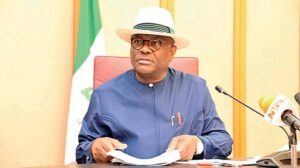A Deepening Political Crisis in Rivers State
The political tension in Rivers State has taken a new turn as the Minister of the Federal Capital Territory (FCT), Nyesom Wike, declared his support for the Rivers State House of Assembly in its ongoing tussle with Governor Siminalayi Fubara. Wike, a former governor of the state, emphasized that he would not interfere with the Assembly’s constitutional duties, even as the conflict between the legislative and executive arms of government continues to escalate.

The Root of the Conflict: Budget Presentation Dispute
The crisis stems from a disagreement over the presentation of the state’s 2025 budget. Governor Fubara had initially presented the budget to a faction of lawmakers led by Victor Oko-Jumbo. However, the Supreme Court recently recognized Martin Amaewhule and his group as the legitimate members of the Rivers State House of Assembly.
Following the court’s verdict, the Assembly, led by Amaewhule, asked Fubara to re-present the budget. This request has sparked a heated exchange between the governor and the lawmakers, with Fubara accusing the Assembly of frustrating his efforts to fulfill his executive duties.
Wike’s Stance: Support for the Assembly
During a Thanksgiving Service held in Abalama, Asari-Toru Local Government Area of Rivers State, Wike made his position clear. He stated that he would not stand in the way of the Assembly’s constitutional responsibilities and urged all parties to allow the legislature to perform its duties without interference.
“Let me tell you, I’m not going to stop the Assembly from performing their constitutional duties. The Assembly should be allowed to perform their constitutional role,” Wike said.
He further emphasized that the lawmakers should be free to carry out their functions as they deem necessary, provided their actions are within the bounds of the constitution.
Accusations Against Governor Fubara
Wike did not hold back in his criticism of Governor Fubara, accusing him of withholding allowances and other benefits due to members of the Rivers State House of Assembly. He claimed that Fubara’s actions were aimed at undermining the legislature and consolidating power within the executive branch.
The FCT minister also alleged that Fubara had been misled into recognizing a faction of lawmakers, with assurances that there would be no consequences. “He was deceived into recognizing a group of lawmakers and was wrongly assured that nothing would happen,” Wike stated.
A History of Political Rivalry
The current crisis is not an isolated incident but rather a continuation of the long-standing political rivalry between Wike and Fubara. Wike, who served as governor of Rivers State from 2015 to 2023, played a significant role in Fubara’s emergence as his successor. However, their relationship has since soured, with both leaders now locked in a battle for control of the state’s political machinery.
This power struggle has divided the state’s political landscape, with loyalists of both leaders taking sides and further complicating the situation.
Read also: “Wike Sets Conditions for Peace in Rivers State: Budget Re-Presentation and Commissioner List”
Implications for Governance in Rivers State
The ongoing conflict between the executive and legislative arms of government in Rivers State has raised concerns about governance and development in the state. With both sides locked in a stalemate, the passage of the 2025 budget and other critical legislative matters remain in limbo.
This impasse could have far-reaching consequences for the state’s economy, infrastructure projects, and overall development. Experts warn that the prolonged crisis could deter investors and undermine public confidence in the government’s ability to deliver on its promises.
Calls for Resolution
Amid the escalating tensions, there have been calls for dialogue and reconciliation to resolve the crisis. Stakeholders, including traditional rulers, civil society organizations, and political leaders, have urged both parties to prioritize the interests of the state and its people over personal or political grievances.
Wike, while reiterating his support for the Assembly, also hinted at the need for a resolution. “Whatever they deem necessary and fit, that is constitutional, they should do. I’m not going to stop anybody from carrying out their functions,” he said, leaving the door open for potential negotiations.
A Test of Leadership and Governance
The political crisis in Rivers State is a test of leadership and governance, not just for Governor Fubara and the House of Assembly, but for all stakeholders involved. As the conflict continues to unfold, the focus must remain on finding a peaceful and constitutional resolution that prioritizes the welfare of the people and the development of the state.
For now, Wike’s public backing of the Assembly has added a new dimension to the crisis, setting the stage for further political maneuvering in the weeks and months ahead.